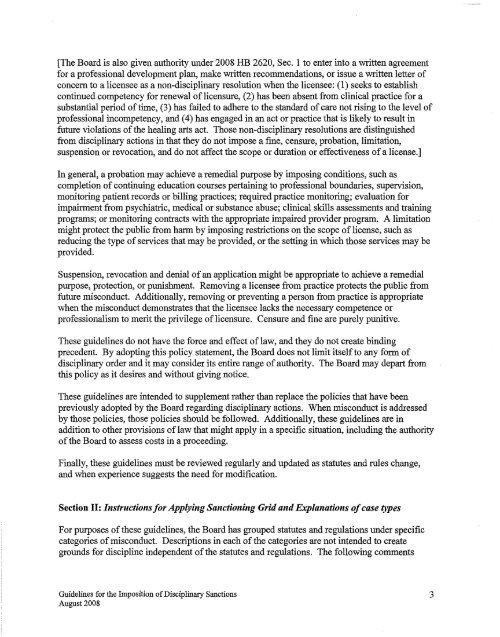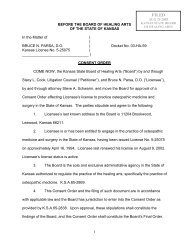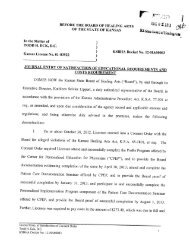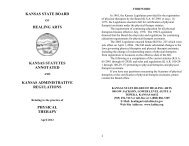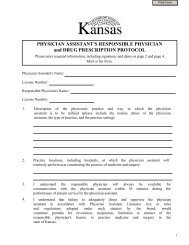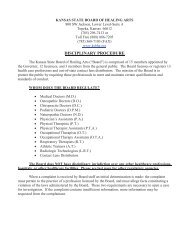ksbha guidance document index - Kansas State Board of Healing Arts
ksbha guidance document index - Kansas State Board of Healing Arts
ksbha guidance document index - Kansas State Board of Healing Arts
Create successful ePaper yourself
Turn your PDF publications into a flip-book with our unique Google optimized e-Paper software.
[The <strong>Board</strong> is also given authority under 2008 HB 2620, Sec. 1 to enter into a written agreement<br />
for a pr<strong>of</strong>essional development plan, make written recommendations, or issue a written letter <strong>of</strong><br />
concern to a licensee as a non-disciplinary resolution when the licensee: (1) seeks to establish<br />
continued competency for renewal <strong>of</strong> licensure, (2) has been absent from clinical practice for a<br />
substantial period <strong>of</strong> time, (3) has failed to adhere to the standard <strong>of</strong> care not rising to the level <strong>of</strong><br />
pr<strong>of</strong>essional incompetency, and ( 4) has engaged in an act or practice that is likely to result in<br />
future violations <strong>of</strong> the healing arts act. Those non-disciplinary resolutions are distinguished<br />
from disciplinary actions in that they do not impose a fme, censure, probation, limitation,<br />
suspension or revocation, and do not affect the scope or duration or effectiveness <strong>of</strong> a license.]<br />
In general, a probation may achieve a remedial purpose by imposing conditions, such as<br />
completion <strong>of</strong> continuing education courses pertaining to pr<strong>of</strong>essional boundaries, supervision,<br />
monitoring patient records or billing practices; required practice monitoring; evaluation for<br />
impairment from psychiatric, medical or substance abuse; clinical skills assessments and training<br />
programs; or monitoring contracts with the appropriate impaired provider program. A limitation<br />
might protect the public from harm by imposing restrictions on the scope <strong>of</strong> license, such as<br />
reducing the type <strong>of</strong> services that may be provided, or the setting in which those services may be<br />
provided.<br />
Suspension, revocation and denial <strong>of</strong> an application might be appropriate to achieve a remedial<br />
purpose, protection, or punishment. Removing a licensee from practice protects the public from<br />
future misconduct. Additionally, removing or preventing a person from practice is appropriate<br />
when the misconduct demonstrates that the licensee lacks the necessary competence or<br />
pr<strong>of</strong>essionalism to merit the privilege <strong>of</strong>licensure. Censure and fine are purely punitive.<br />
These guidelines do not have the force and effect <strong>of</strong>law, and they do not create binding<br />
precedent. By adopting this policy statement, the <strong>Board</strong> does not limit itself to any form <strong>of</strong><br />
disciplinary order and it may consider its entire range <strong>of</strong> authority. The <strong>Board</strong> may depart from<br />
this policy as it desires and without giving notice.<br />
These guidelines are intended to supplement rather than replace the policies that have been<br />
previously adopted by the <strong>Board</strong> regarding disciplinary actions. When misconduct is addressed<br />
by those policies, those policies should be followed. Additionally, these guidelines are in<br />
addition to other provisions <strong>of</strong> law that might apply in a specific situation, including the authority<br />
<strong>of</strong>the <strong>Board</strong> to assess costs in a proceeding.<br />
Finally, these guidelines must be reviewed regularly and updated as statutes and rules change,<br />
and when experience suggests the need for modification.<br />
Section II: Instructions for Applying Sanctioning Grid and Explanations <strong>of</strong> case types<br />
For purposes <strong>of</strong> these guidelines, the <strong>Board</strong> has grouped statutes and regulations under specific<br />
categories <strong>of</strong> misconduct. Descriptions in each <strong>of</strong> the categories are not intended to create<br />
grounds for discipline independent <strong>of</strong> the statutes and regulations. The following comments<br />
Guidelines for the Imposition <strong>of</strong> Disciplinary Sanctions<br />
August2008<br />
3


